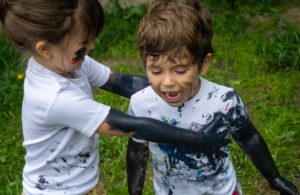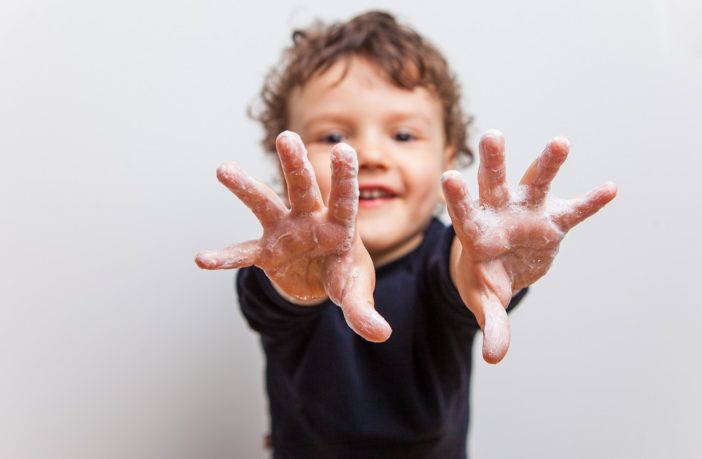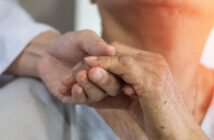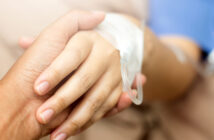This week saw the return to school for many children in the UK. But, with COVID-19 still a widespread risk to our health, can handwashing be implemented in the routine of early years without disrupting their development? Dr Jackie Musgrave, Programme Leader in Early Childhood at The Open University shares her thoughts.

Jackie Musgrave
I have to confess that I am in a quandary at the moment – my quandary is about the focus on handwashing to reduce the risk of the spread of COVID-19 in early years settings and schools. This is not to say that I am questioning its importance, far from it, but I am questioning the way that increased levels of attention to handwashing may impact on children.
The lessons I learned from fierce theatre sisters and flamboyant surgeons when I was on placement as a student nurse in operating theatres have stayed with me. I recall one especially cavalier surgeon gowning up and putting a face mask in place and then paying meticulous attention to handwashing, whilst giving a monologue on the perils of not removing the micro-organisms from skin surfaces. He regaled us with tales of how inadequate handwashing could result in the transmission of micro-organisms, which could relay life-threatening infections such as gangrene to the patients. Any breach of attention to handwashing was met with a severe reprimand and the messages from those days remain with me many years later.
To say that I am an advocate of regular and thorough handwashing routines is putting it mildly, I have fundamentalist views about it and constantly question my family, including (grown-up) children if they have washed their hands at important times. I am almost ashamed to say that the young children in the family are so used to my interrogation that they come and waft their (often still damp) hands in front of me instructing me to ‘smell my hands’ – this is aimed at reassuring me that they have used soap to wash their hands after visiting the toilet. I am so tuned in to listening to the sound of running water and the length of time it should take for a decent handwash that I only have to throw a questioning glance at them and they pause and scuttle back to complete the handwashing task.
In pre-COVID times, it was always the case that children and practitioners in early childhood education and care settings were prone to catching infectious diseases, any place where there are large numbers of people in close proximity are ideal spaces for the transmission of micro-organisms. As early childhood education and care (ECEC) practitioners know, children can be very helpful to viruses because they are not especially reliable in their handwashing habits or their ability to know when they are about to sneeze; often spraying their virus-laden saliva far and wide. However, it appears that children are not so good at transmitting COVID, which is of course, very welcome news.
Even though the number of confirmed cases of COVID in children in the UK is reported as being considerably lower versus cases in adults, we still need to remain mindful about the risk of all communicable diseases, not just COVID. This is because communicable diseases can have a disproportionate impact on people who are vulnerable, and this is especially relevant to babies and very young children. Not only do they have immature immune systems, but there is an increasing number of children attending early years settings with complex medical needs and chronic health conditions, such as asthma and diabetes who are especially vulnerable to infection and require protection. Therefore, careful management of prevention to minimise the spread of infection is imperative to protect all children.
As the world is attempting to reinstate attendance at pre-school, nurseries and schools my thoughts have turned to how those who work and care for young children can protect them from becoming infected by the virus. The current advice from health agencies around the world highlights the importance of handwashing and using tissues to cover mouths when sneezing and coughing.
The Chief Medical Officers of the four countries of the UK have stated that it is not possible to remove all of the risks posed by COVID within schools, instead each school needs to adopt a risk-based approach. Pre-school settings are not mentioned in the CMOs’ statement, however, recent guidance from the Department for Education states that nurseries should ensure that everyone cleans their hands more often than usual, including when they arrive, when they return from breaks, and before and after eating – this should be done for 20 seconds with soap and running water or hand sanitiser.
The guidance about cleaning hands more often than usual is of course not very specific and this is where practitioners will need to use their wisdom and knowledge to assess how and when ‘more’ handwashing is needed in order to mitigate the risk of spreading infection. So this is my quandary, on one hand (no pun intended), there is a need to mitigate the risk of the transmission of COVID in schools and pre-school settings, and one key way of doing so is to ensure that children wash their hands regularly and effectively. However, how is the ‘more often than usual’ handwashing guidance going to be implemented?

Children partaking in messy play
Susan Isaacs, a pioneer of nursery education, is credited with saying that ‘play is indeed the child’s work’ (Isaacs, 1929). She explains the importance of play to young children’s emotional and social wellbeing as well as their learning. Giving young children the opportunity to play with mud, soil and clay can help them to learn through their senses and help with their holistic development. But, such activities are messy and there may be added concerns about the additional risk of these activities being a risk to the spread of infection. Young children need to be given the opportunity to explore a range of play resources and activities, will they be discouraged from touching items in the same way as adults are instructed to not touch items in shops in order to reduce the risk of infection? Children need time to become engrossed in their play activities in order to learn and develop, if there are constant and/or frequent additional breaks for handwashing this will interrupt their flow of thinking and play and in turn, could impact on their development and wellbeing.
The imperative to prevent infections is ever-present, not just in these uncertain times. Making the space to reflect on how we role-model effective hand hygiene and teach children when and how to handwash, as well as how to use tissues to catch those bodily fluids is a simple and effective way to improve the health and wellbeing of children and all adults – not just in this time of crisis but at all times. However, we need to be mindful of how we implement additional handwashing into children’s routines or we face the possibility of preventing communicable diseases, but inadvertently by reducing children’s play opportunities, we face the risk of diminishing their wellbeing and increasing the incidence of mental illness.
References
Isaacs, S. (1929) The Nursery Years: the mind of the child from birth to six years. London: Routledge and Kegan
Useful resources
For more information and resources about hygiene and the prevention of infection in early years settings, please take a look at the Pacey (Professional Association for Childcare and Early Years) website – available from https://www.pacey.org.uk/working-in-childcare/spotlight-on/coronavirus/hygiene-and-prevention/
Further reading
Musgrave, J. Infectious diseases, infestations and the acutely ill child chapter in Musgrave, J. (2017) Supporting children’s health and wellbeing. London: Sage.
Musgrave, J. Preventing infections in early years settings. April 2018 in Parenta magazine available from https://www.parenta.com/2018/06/01/preventing-infections-in-early-years-settings/



